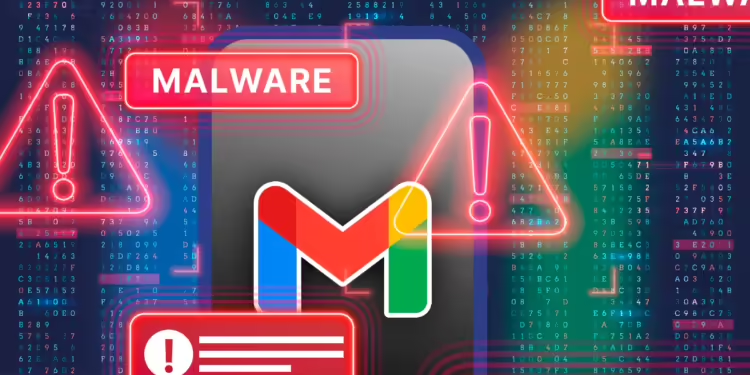In an age where digital communication reigns supreme, scammers are becoming increasingly adept at exploiting vulnerabilities in our online lives. A recent warning from Microsoft Solutions Consultant Sam Mitrovic highlights a particularly cunning Gmail scam that has the potential to compromise your account and personal information. In a world where one notification could lead to disaster, vigilance is your best defense.

A Cautionary Tale: Sam Mitrovic’s Close Call
Mitrovic, an expert in tech solutions, found himself on the brink of falling victim to this scam when he received a notification that appeared to be a legitimate request for Gmail account recovery.
“I received a notification asking me to approve a Gmail account recovery attempt that I did not initiate,”
he recounted in a recent blog post. After dismissing the request, he received a follow-up call from Google Sydney, which would soon lead to an unsettling conversation.
A week later, at the same time, Mitrovic received another notification. This time, he chose to answer the phone call. To his surprise, the voice on the other end, although claiming to be from Google, raised red flags. The caller inquired whether he was traveling or had logged in from Germany—questions designed to invoke panic and force compliance.
“When I responded ‘No’ to both questions, I was informed that someone had accessed my account for a week and had downloaded data,”
Mitrovic explained.
Recognizing the Signs: Scams Are Evolving
Mitrovic’s experience sheds light on how these scams are becoming increasingly sophisticated.
“The scams are getting increasingly sophisticated, more convincing and are deployed at ever larger scale,”
he noted. The emotional manipulation involved makes it easier for unsuspecting individuals to fall prey to such tactics. Scammers are leveraging advanced technologies, including AI-generated voices, to create a more believable front.

Realizing the potential danger, Mitrovic took proactive measures. He asked for an email to validate the call, an action that would ultimately save him. While on the line, he heard the sound of typing in the background—an alarming detail that suggested the call may not be legitimate. When the email arrived, it initially appeared credible, but a closer inspection revealed a non-Google domain in the “to” field, signaling a red flag.
The Technology Behind the Scam: A Deep Dive
The email, although professionally crafted, was a façade. Scammers used Salesforce CRM technology to disguise the sender address, enabling them to impersonate legitimate entities while using Gmail servers. This highlights the lengths to which scammers will go to appear legitimate.
Had Mitrovic authorized the account recovery, he could have lost complete control over his Gmail account, potentially exposing personal data and sensitive information.
“There are many tools to fight the scammers; however, at an individual level, the best tool is still vigilance,”
he warned.
Community Awareness: Sharing Experiences
The conversation on Reddit and various online platforms reveals a community grappling with similar experiences. Other users reported receiving identical scam notifications, yet many were not as fortunate as Mitrovic. The authenticity of the scam’s presentation often blurs the line between reality and deception, leaving individuals confused and vulnerable.
In a chilling turn, some victims mistakenly believed they were communicating with Google support, leading them to authorize critical actions that ultimately compromised their accounts.
“It’s scary to think about what could happen if you approve the account recovery notification,”
Mitrovic cautioned. This emphasizes the importance of skepticism when dealing with unexpected notifications, especially those requesting personal information.
How to Protect Yourself from Gmail Scams
To avoid falling victim to such scams, it’s crucial to adopt a proactive approach. Here are several tips to safeguard your Gmail account:
- Never Approve Unexpected Requests: If you receive a notification to approve an account recovery, do not accept it without verification. Scammers often use these requests to lure victims into a phishing trap.
- Verify Phone Calls: If you receive a suspicious call, do not engage. Instead, hang up and verify the legitimacy of the call by contacting the company directly using a trusted number found online.
- Check Email Domains: Always inspect email addresses carefully. If you see unfamiliar domains or addresses, treat the email as suspicious.
- Stay Informed: Keep up to date on the latest scams by following trusted technology news sources and communities.
- Educate Others: Share information about these scams with friends and family to help protect them from potential threats.

In a digital world fraught with deception, being informed and alert is the best way to protect your personal information. With scammers constantly evolving their tactics, it’s crucial to remain vigilant and skeptical, ensuring that you don’t become the next victim in this ongoing battle against cybercrime.










